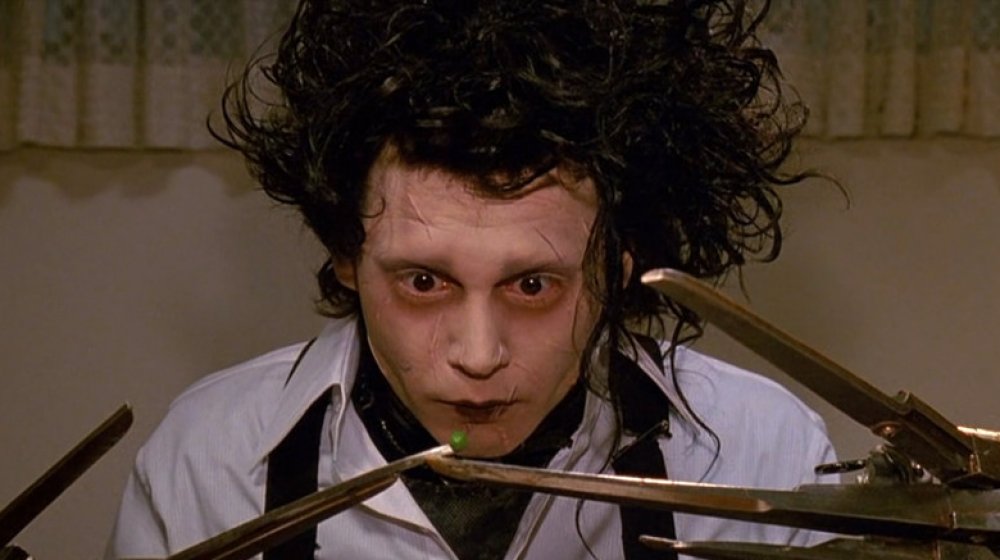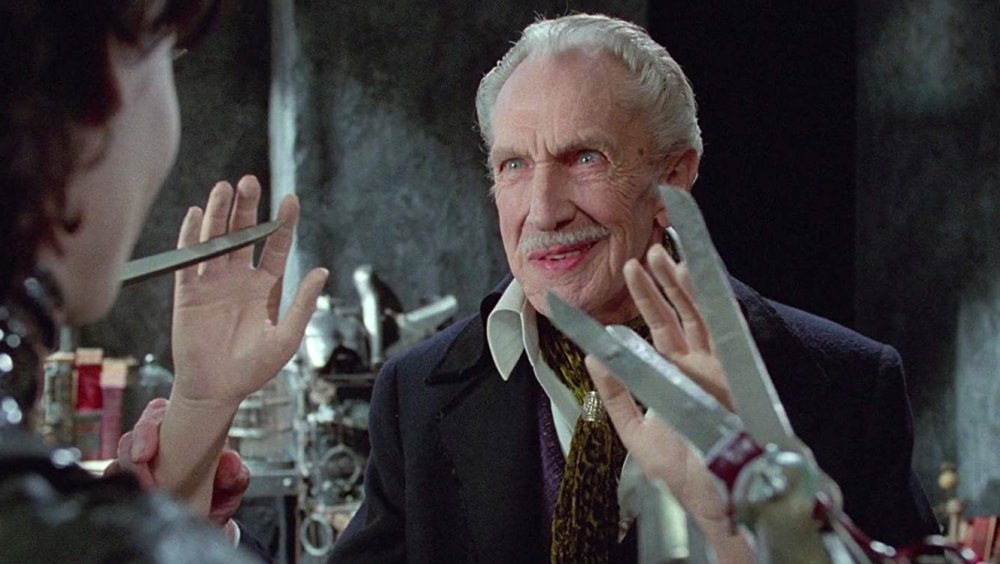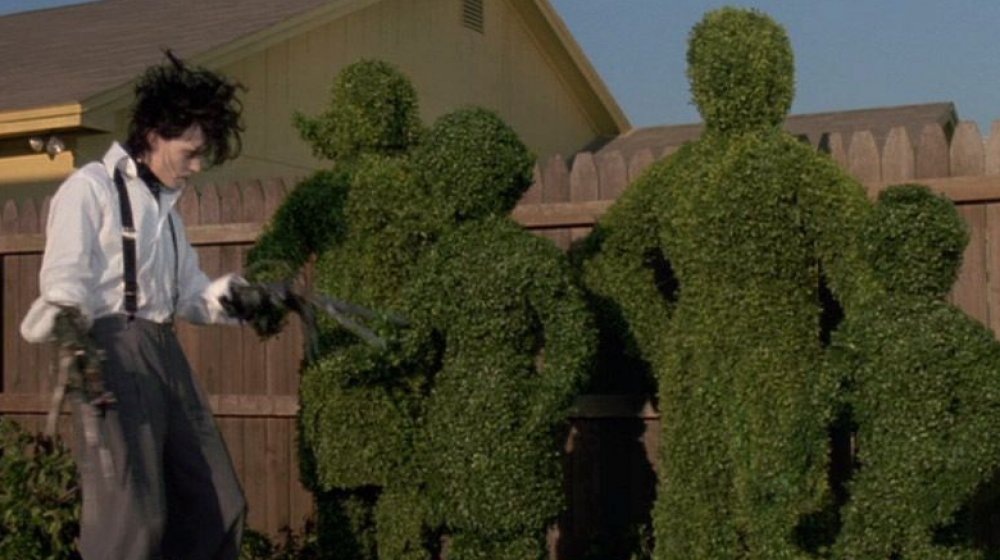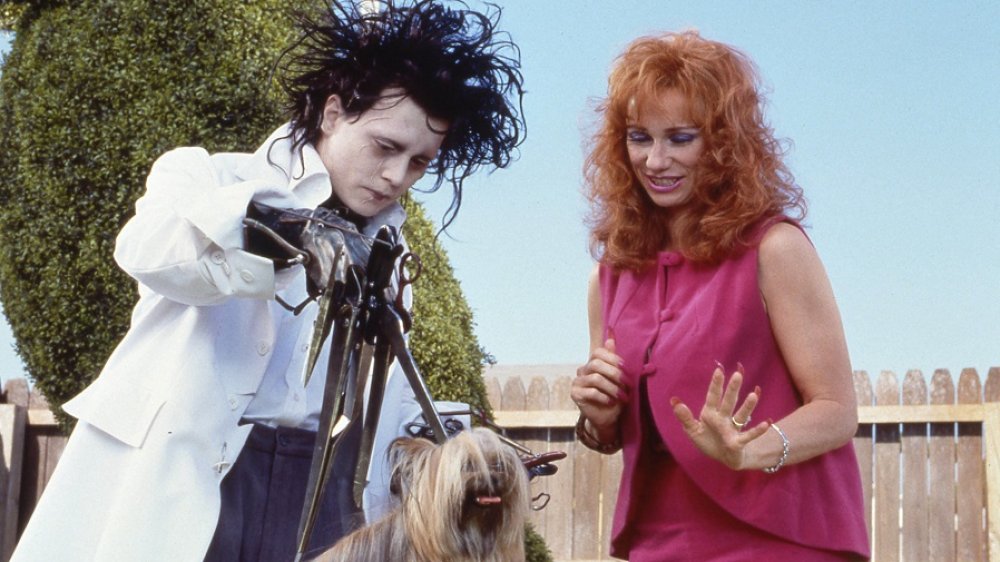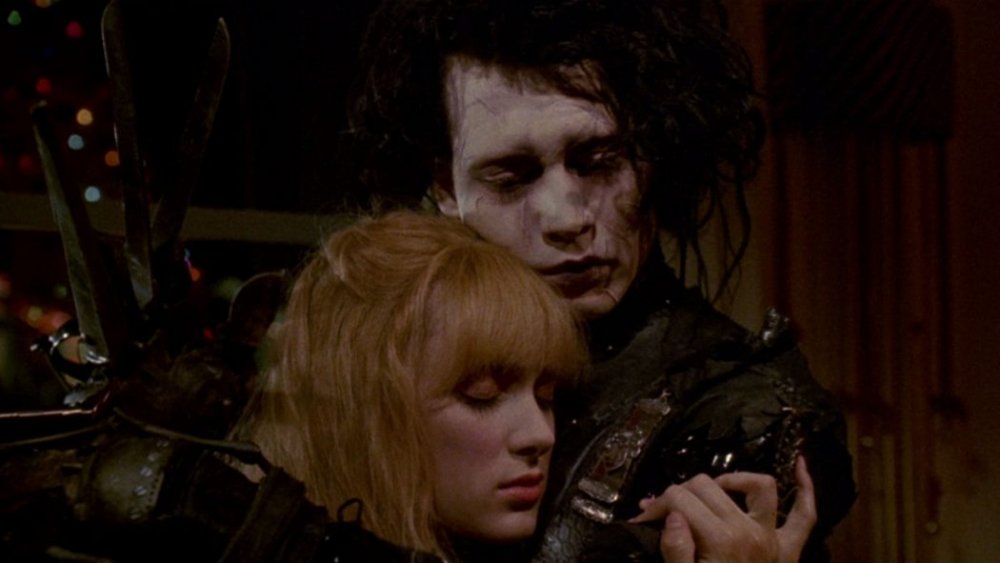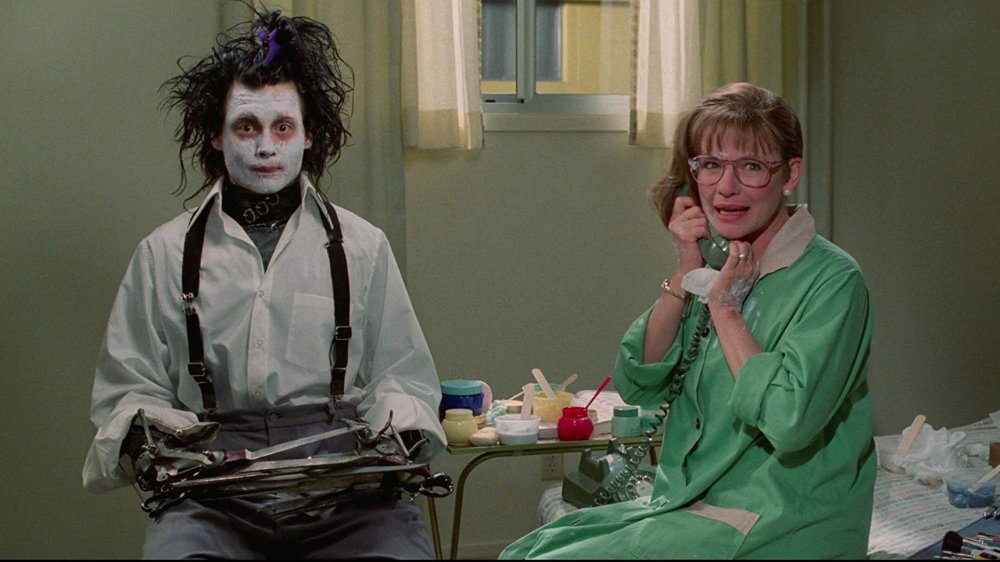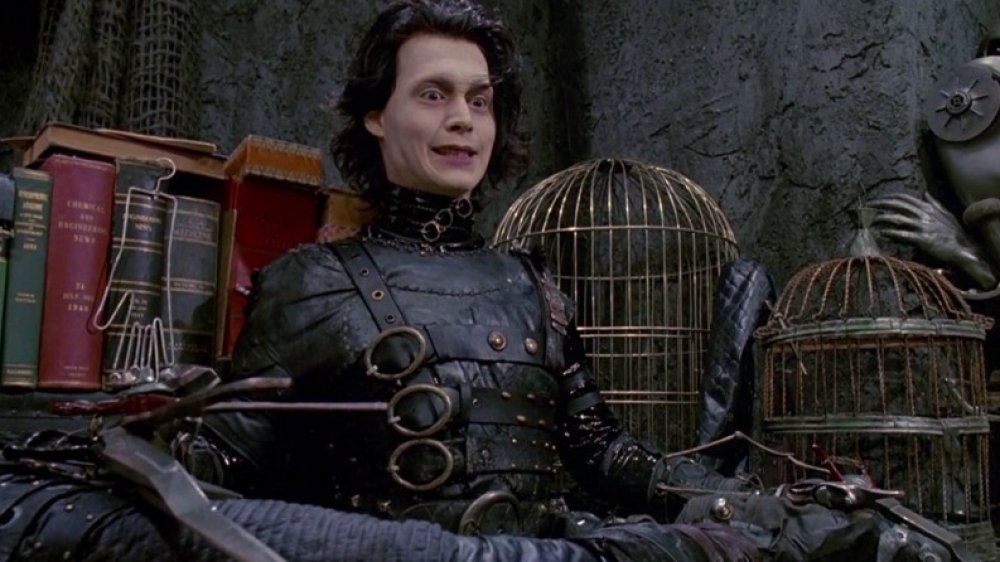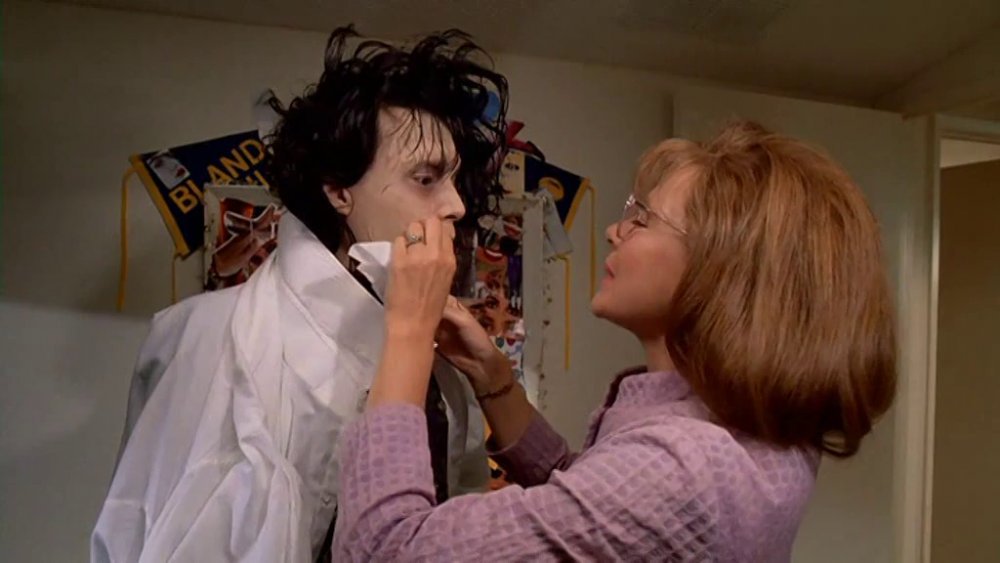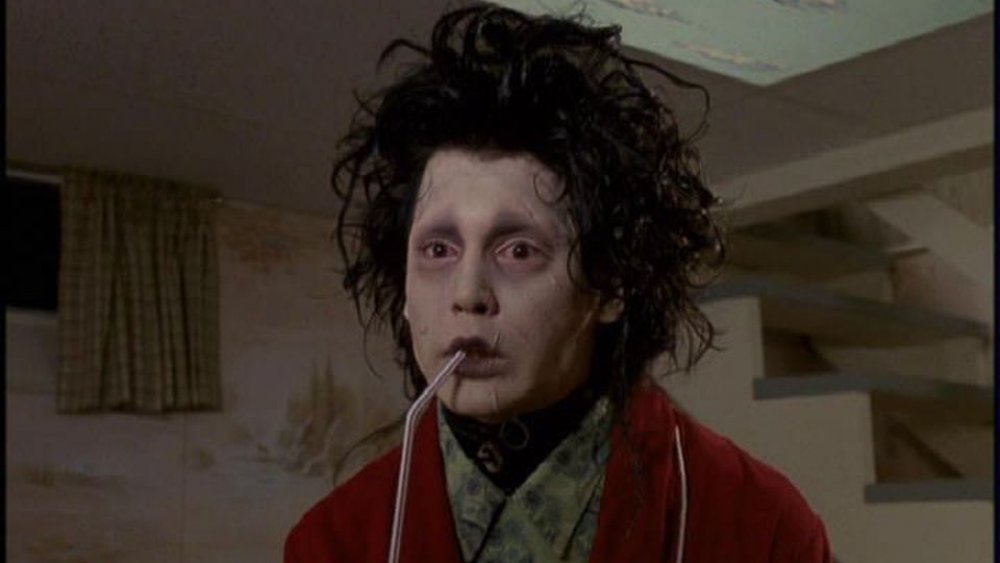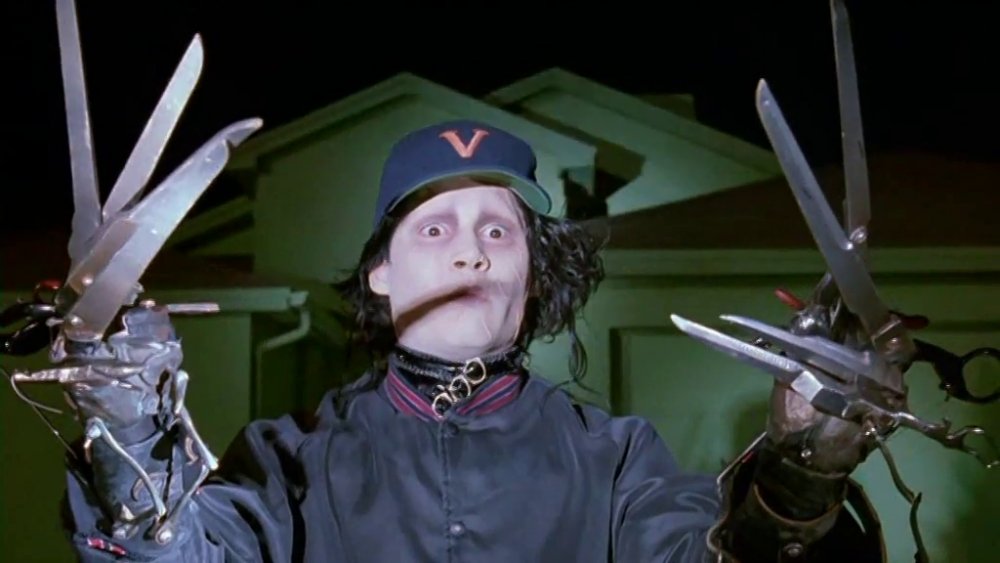Things Only Adults Notice In Edward Scissorhands
Before Tim Burton became known for being the mastermind behind The Nightmare Before Christmas, which launched him into goth-kid notoriety for decades to come, he conceived and directed a different dark, touching film about "an uncommonly gentle man." Edward Scissorhands is the bittersweet tale of Edward (Johnny Depp), a man created by an elderly inventor (Vincent Price) who dies before he can finish his work. Edward is left with scissors for hands, hearkening to his previous life as part of a cookie-making machine. When intrepid Avon seller Peg Boggs (Diane Wiest) discovers Edward languishing away all alone in a giant spooky mansion above her little suburban town, she brings him down from hiding and tries her best to introduce him into her community.
The film is, by turns, delightful and heartbreaking, appealing to viewers of all ages for nearly three decades. Children who watched it upon its release in 1990 are likely to gain different insight into it as adults, and the children of today will likely miss some of the movie's most poignant themes or references. But that just means they will always have something to gain by rewatching this timeless film about identity, love, and sacrifice.
Vincent Price's curtain call in Edward Scissorhands
Even '90s kids don't necessarily remember Vincent Price. At the time of Edward Scissorhands' release, Price was nearing the end of his life — but what a life it was! Price had been working in film and television since the late 1930s, making a name for himself especially within the horror genre. This started early on for him, with a role in the Basil Rathbone and Boris Karloff film The Tower of London in 1939, followed the next year by the titular role in The Invisible Man Returns. From there, the horror roles kept coming, with classics like The House of Wax, The Fly (and its sequel), and House on Haunted Hill. Contemporary audiences of the '90s would likely recognize him more from his guest appearance on The Muppet Show or his narration and bone-chilling cackle on Michael Jackson's "Thriller."
Tim Burton was unsurprisingly a big fan of this horror icon. In 1982, the young director asked Price to narrate his six-minute short film "Vincent," all about a little boy who wants to be just like Vincent Price. Little Vincent aspires to be a mad scientist, so it is appropriate that for his last really major role, Price plays a more sympathetic Frankenstein-esque Inventor who brings the gentle Edward to life out of his own yearning for companionship.
Edward Scissorhands' criticism of small-town suburbia
It is obvious to everyone that Edward does not belong in suburbia, but what might be less obvious to the younger set is the scathing criticism of that insular setting. Immediately upon Edward's arrival, housewives began calling each other up, each theorizing to the other who the mysterious man with Peg might be. Initially they are welcoming of this strange new man, this creature with scissors for hands. But as life for Edward becomes more complicated, the townsfolk are quick to turn on him, fearing his difference. A veteran at the Boggs' barbecue who's bonded with him over having a disability, telling him to never let anyone call him handicapped, later refers to Edward as a "cripple." Kim's (Winona Ryder) boyfriend, Jim (Anthony Michael Hall), immediately decides that Edward is a freak, that both his scissorhands and his quiet demeanor mean he doesn't fit in with the other guys.
Everyone in this town knows everyone else, and inserting someone new — and decidedly unique — into their midst breeds resentment, fear, and chaos. In this way, the film serves as a message for everyone who ever felt like an outcast growing up: you don't fit in here, but it's not your fault. Adults are more likely to recognize the in-group mentality of the town's citizens, though young viewers might understand the general feeling of being left out or misunderstood.
The burden of the suburban woman
Suburban critique comes about in this film in another way: how the women feel in their romantic relationships. Joyce and her rampant unhappy-housewife sexuality is the most obvious example of this theme. When we first meet Joyce (Kathy Baker), she is attempting to seduce the plumber fixing her dishwasher. As soon as Edward arrives in town, she decides that he is her new target. She spoon-feeds him her ambrosia salad, takes excessive pleasure in receiving a haircut from him, and even begins a little strip-tease that results in him fleeing after she climbs atop him.
More subtle are the early interactions between Peg and her husband Bill (Alan Arkin), who only seems to half-listen to anything his wife is saying. Peg clearly does the brunt of the emotional work in the household, and Bill takes on a more distanced stance, unbothered and unemotional about the goings-on of his family. And of course Kim's boyfriend, Jim, is the ultimate toxic jock boyfriend of teen dramas — rowdy, possessive, mean, and manipulative. The implication that these kinds of relationships are all that suburbia has to offer its women is a dour one, and one that younger audiences, lacking in romantic experience, would likely not pick up on until they are much older.
The importance of touch
Children are very proactive about touch, using their hands to help them understand the world around them. (How many times have parents had to admonish their kids to "look, don't touch!") But it is hard to say whether they understand why touch is so important, especially in the context of interpersonal relationships. Because Edward does not have human hands, he feels like he is lacking. He is unable to touch his own face, let alone the face of anyone he cares for, as evidenced by his painful caress of the Inventor after the elderly man falls down dead.
The Inventor created Edward to ease his own loneliness, but because he was unable to finish him, he doomed Edward to a life lacking in physical contact. Edward is very aware of this, remarking when Peg meets him, "I'm not finished." And toward the end of the film, when Kim asks him to hold her, he sadly gazes at his scissors and replies, "I can't." More than a physical disability, Edward's inability to touch prevents him from being able to express physical affection, thereby stunting his emotional connections with those around him. This emotional distance plays out at the end of the film, when he realizes he must also keep a physical distance from regular townspeople.
Edward Scissorhands blends '90s culture with a mid-century aesthetic
The kids of today might find themselves a little confused by some of the trappings of life in 1990. To begin with, Peg's job as an Avon saleswoman who goes door to door will seem obsolete in this age of the internet. People who are peddling wares generally do a lot of their legwork over social media instead of attempting to ring bells and solicit customers in person. And though the company still exists, Avon is becoming less relevant in a world chock-full of makeup and skincare companies all striving to secure their market — never mind that most kids don't know or care too much about makeup to begin with.
Another very '90s stand-out is the Boggs' answering machine — and of course the phone itself being plugged in and on a cord. The machine still uses tapes to record messages, another foreign object to the modern digital-literate kid. And the Boggs' television is an old CRT, a far cry from the flat screens of today. On top of all this, Burton channels plenty of oh-so-'60s aesthetics — in the fashion, the color palettes, the ever-present Tom Jones music — to capture a feeling of the suburbia of his childhood, only further confusing young viewers who lived through neither period. Though Millennials will recognize some echoes of their youth, the next generation is likely to feel that, despite the movie's emotional relevance, it is largely a period piece.
Edward Scissorhands' ties to Frankenstein
Everyone has a mental image of Frankenstein's monster, and probably most people, regardless of age, know that he was brought to life by a scientist. But the themes of Mary Shelley's novel are not likely to be well-known among the younger crowd, and their connections to themes in Edward Scissorhands would be hard for that group to pick out. Shelley's original novel was horrifying because it put forth a shocking concept: what if a man built another man using human parts? What if that man became like God, did something that only God should be able to do?
Victor Frankenstein, unlike the Inventor in this movie, is not a terribly sympathetic character. His motives for making a man are out of selfish delusion, and he neglects the monster once it comes to life. The Inventor, on the other hand, makes a man whom he treats as a son. But the underlying message is the same: should he have meddled in affairs best left to an unknown creator?
Edward's life, much like Frankenstein's monster, is riddled with challenges based in others' fear of him, despite his gentle nature. He is misunderstood, doomed to lead what he believes is an incomplete life. Should he ever have been created in the first place? Literary adults will notice this parallel, as will those familiar with Burton's other works like "Vincent" or either incarnation of Frankenweenie, which show that Burton holds Frankenstein and his monster close to his heart.
Edward's parental relationships
Adults, and especially those with children of their own or who are close friends with other parents, will notice Edward's interactions with the parental figures in his life more keenly than a child would. The Inventor is very much a father figure to Edward, not only building him, but kindly guiding him through etiquette lessons and reading him poetry. When the Inventor creates hands for Edward, he presents them to his scissor-handed son as a Christmas present — the last great gift he had left to give. When the Inventor dies, Edward is left alone with only his memory, and with the endless desire to be completed.
Peg finds him and, in true motherly form, immediately decides that she will bring him down out of his tower and help him find his place in society. She encourages his unique skills, tries to help him conceal his facial scars, and welcomes him into her home and her family unconditionally. When someone tells Edward that if he loses his scissors and gets human hands he will no longer be special, Peg confidently replies, "No matter what, Edward will always be special." Spoken like a true mom! It is gratifying that, even though so much goes wrong for Edward in the course of this movie, he at least had two parental figures who very clearly cared for him and his well-being.
That's not just lemonade
About a third of the way through the movie, Edward is introduced to Peg's daughter, Kim, for the first time. Unfortunately, it's a traumatic introduction involving a lot of screaming and the deflation of a waterbed, so when Bill sets Edward up on the folding couch in the basement, he also offers the startled young man a drink. When Edward asks what it is, Bill replies, "Lemonade," which seems innocuous enough. But what kids probably won't see is that Bill has actually poured liquor for Edward, probably some kind of whiskey.
Edward drinks it all at once with the aid of a straw and is immediately overwhelmed by the burning sensation. The next day, while he's trimming Peg's bushes, she offers him actual lemonade, and the mention of it causes Edward to throw up. A younger viewer is less likely to make the connection between booze and lemonade in this context than someone who has a little more drinking experience.
Exploiting Edward
At first glance, it seems like the townspeople embrace Edward and his unique abilities — and in some ways, they do. They are impressed by his artistic ability with topiaries and hairdressing, encouraging him to start his own salon. But none of them have ever paid him for his work, and he is brought in for show and tell as though he is an object. Kim's boyfriend sees Edward as a convenient tool with which to rob his own father, using his scissors to unlock a high-security door. And once things start to go awry for poor Edward, the majority of the townspeople choose to turn on him, exclaiming that they always knew something was wrong with him, that he was dangerous.
With the exception of the Boggs family, no one cares for Edward except for what he could do for them. They love him only while they can exploit him. For a lot of kids, the pleasant interactions Edward has in the beginning of the film may seem genuine, but adults are more likely to see how Edward is naively getting used without realizing it. He is content for a time and feels largely welcome, so he is confused and frustrated when none of the townspeople come to his aid. It is a sad view of society, but one that underscores the major theme of this movie: it is hard to fit in when you have a perceived difference, whether that's physical or otherwise. It is hard to be loved completely for who you are.
